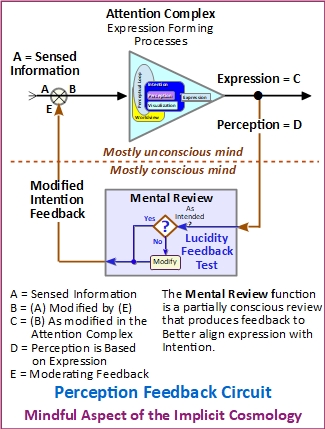The Question
I suggest that skepticism may be a fear response. This seems especially true of denial skepticism as opposed to inquiry skepticism. Here, I define “denial skepticism” as the argument that something is not real or actual. “Inquiry skepticism,” then, would be a suspension of judgement until more is learned.
Assumptions
- What we perceive is a worldview-moderated version of our sensed environmental information.
- Our conscious perception (awareness) is derived from our mostly unconscious expression.
- The one conscious influence we have on the mental process that develops our perception is our intention.
- Our expression of intention is moderated by our temperament and predisposition (for example fearful versus not easily frightened).
- Our intentionality tends to be habitual in the sense that we have a predisposition to intend what we have learned to expect.
-
- Referring to the Perception Feedback Circuit Diagram above, if we agree with our perception (what we are thinking), our Moderating Feedback signal (E) will be the same as our initial expression (C).
- If we are predisposed to a particular response, our Moderating Feedback signal (E) will tend to amplify our initial expression (C) if it agrees with or is suggestive of that predisposition.
The Argument
Spiritualists describe mediumistic messages that are likely changed to agree with the medium’s preconceptions as “colored message.” Mediumistic development is largely concerned with learning how to “step aside” so that the communicating personality’s message is more as intended.
I think it is true that no trans-etheric communication comes to us without a little coloring. This includes ITC.
Some parapsychologists are especially aggressive deniers of anything supporting the idea of continuous life. For instance, it is predictable that people who identify with Anomalistic Psychology are survival hypothesis deniers. But the denial is less obvious if the person identifies with the Exceptional Experiences Psychology school of thought. Those who study under the banner of Consciousness Studies tend to support the idea of survived memory rather than survived personality.
A common characteristic of deniers appears to be the way they argue (color) their point under cloak of academic authority. It is as if some researchers use such ambiguous terminology that it is difficult to tell if they are debunking or supporting the Survival Hypothesis. Some academics think it is necessary and scientifically proper to be ambiguous.
We have noted instances of ITC in which the practitioner’s predisposition seemed to have colored the tone of the messages they collect. In one example, Lisa who is even minded and not afraid of the dark, recorded for EVP in the same dark room with a person who was fearful. Lisa recorded helpful comments and names while the fearful person recorded scary comments.
We think it is paradoxical for otherwise rational people to accept, even amplify factually unsupported theories. There is little difference between a conspiracy theorist who ignores the lack of proof and a scientist who discounts a reported paranormal experience without first examining the evidence.
Our sense is that both conspiracy believers and denial skeptics share the mental characteristic in which their worldview produces a “doubt” response to an experience. In turn, their Intention Review function produces an “agree” response so that their Moderating Feedback signal (E) is the same as their initial Expression (C) in the Perception Feedback Circuit Diagram. That is the kind of positive feedback that can cause a “runaway” emotional response.
If people’s temperament predisposes them to fearfulness, for instance fear that “their side” will not win, their Intention Review function will amplify that “fear” output and feed it back to the Attention Complex.
People become invested in particular paradigms. For instance, an Anomalistic Psychology professor earns a living teaching that reported paranormal experiences are fraud, misattribution or delusion. Such a person’s Attention Complex will bias perception of environmental signals to agree with their anti-paranormal beliefs and then their predisposition to doubt the reality of things paranormal will tend to produce an amplifying “agree” feedback signal.
My speculation is that denial skeptics comment out of fear about reported experiences that do not agree with their worldview. This does not mean that such people are ignorant or even poorly informed. It does suggest that they have not realized the need to examine the implications of what they think is true.
I would be interested in hearing your thoughts on this.
![]()

